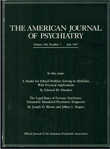Psychiatric Symptoms and Syndromes Among Adolescent Children of Parents With Lithium-Responsive or Lithium-Nonresponsive Bipolar Disorder
Abstract
OBJECTIVE: The purpose of this pilot study was to describe the initial course of psychiatric illness in the adolescent children of parents with bipolar disorder who were divided into two groups on the basis of their response to long-term lithium monotherapy. METHOD: Proband parents met Research Diagnostic Criteria for bipolar illness and predetermined criteria for a clear response or nonresponse to lithium prophylaxis. All adolescent offspring were interviewed by a blinded interviewer using the Schedule for Affective Disorders and Schizophrenia for School-Age Children, and final diagnosis was made by blinded consensus. RESULTS: Psychiatrically ill children of lithium-responsive parents tended to have affective disorders that remitted and followed a recurrent course. Psychiatrically ill children of lithium-nonresponsive parents, however, manifested a broad range of psychopathology, had high rates of comorbid illnesses, and experienced nonremitting affective illnesses. CONCLUSIONS: These results suggest that family history and course of illness are important factors to consider in the diagnosis and pharmacological treatment of affective disorders.



